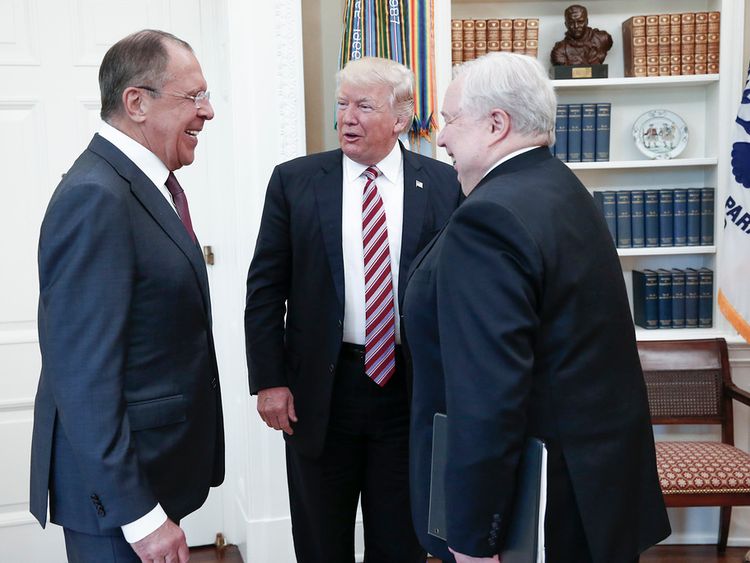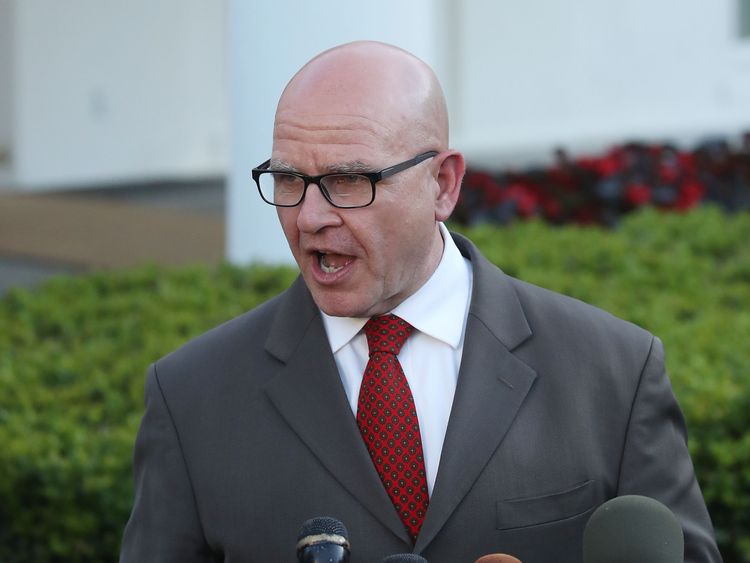According to the Washington Post and others, Mr Trump boasted to Sergei Lavrov and Sergey Kislyak of the great intelligence he had received about an Islamic State plot to use laptops to blow up planes.
But that information had apparently been passed on from another country and was not America's to share.
 Image:During a break Mr Trump jokes with Mr Lavrov (L) and ambassador Sergei Kislyak (R). MFA Russia
Image:During a break Mr Trump jokes with Mr Lavrov (L) and ambassador Sergei Kislyak (R). MFA RussiaIt was also reportedly told in such a way that would have allowed the Russians to work out the nature and even the location and identity of the intelligence source itself.
Anonymous officials also told The Washington Post the information was so sensitive that it had been withheld from America's allies.
The White House issued a denial.
National security advisor General HR McMaster said: "I was in the room, it didn't happen.
 Image:National security adviser General HR McMaster says 'it didn't happen'
Image:National security adviser General HR McMaster says 'it didn't happen'"The President and the foreign minister reviewed a range of common threats to our countries including threats to civil aviation.
"At no time were intelligence sources or methods discussed and the President did not disclose any military operations that were not already publicly known."
As president, Donald Trump has broad powers to declassify information as he sees fit.
There is no suggestion at the moment that President Trump committed a crime, only an accusation that he acted unwisely and in a way that has potentially far reaching consequences.
But there was immediate - and tellingly - cross party concern about what may have happened.
Republican senator John McCain said: "If it's true, obviously it's disturbing."
Trump ally senator Bob Corker said the White House was in a "downward spiral", and that the White House has "got to do something soon to bring itself under control and order".
Republican Paul Ryan said: "The speaker hopes for a full explanation of the facts from the administration."
Democratic senator Ron Wyden said: "These reports - if true - are of the gravest possible concern. It could harm our national security by cutting off important sources of intelligence that protect Americans against terrorist acts."
The meeting in question happened the day after Mr Trump sacked FBI director James Comey, the man in charge of investigating whether the President's campaign colluded with Russia to swing the election.
Mr Trump has also heavily criticised Hillary Clinton over her own careless handling of classified information.
Now, on the eve of his first foreign trip which includes a visit to the Middle East, there are fears that the commander-in-chief may have had a profoundly negative impact on America's reputation as a trusted intelligence sharing partner.


 Image:Mr Macron waves off Francois Hollande as he takes over as French president
Image:Mr Macron waves off Francois Hollande as he takes over as French president Image:Emmanuel Macron and Edouard Philippe shake hands during a meeting in February 2016
Image:Emmanuel Macron and Edouard Philippe shake hands during a meeting in February 2016